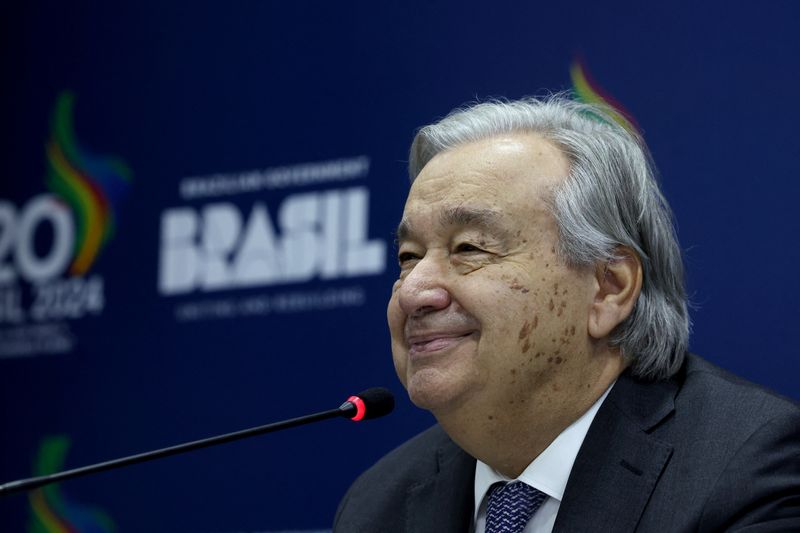By Jake Spring and Lisandra Paraguassu
RIO DE JANEIRO (Reuters) – Diplomatic tensions over international warming will take middle stage on the G20 summit in Brazil this week, as negotiators at U.N. talks in Azerbaijan hit an deadlock on local weather finance that they hope leaders of the world’s 20 main economies can break.
Heads of state arriving in Rio de Janeiro on Sunday for the G20 summit will spend Monday and Tuesday addressing points from poverty and starvation to the reform of worldwide establishments. Nonetheless, the continued U.N. local weather talks have thrown a highlight on their efforts to deal with international warming.
Whereas the COP29 summit in Baku, Azerbaijan, is tasked with agreeing a aim to mobilize a whole bunch of billions of {dollars} for local weather, leaders of the Group of 20 main economies half a world away in Rio are holding the purse strings.
G20 international locations account for 85% of the world’s economic system and are the biggest contributors to multilateral growth banks serving to to steer local weather finance. They’re additionally liable for greater than three-quarters of greenhouse fuel emissions worldwide.
“The spotlight is naturally on the G20. They account for 80 percent of global emissions,” U.N. Secretary Basic Antonio Guterres advised reporters in Rio de Janeiro. He expressed concern in regards to the state of the COP29 talks in Baku and known as on G20 leaders to do extra to battle local weather change.
“Now is the time for leadership by example from the world’s largest economies and emitters,” Guterres stated.
Reaching settlement could solely get more durable with the return to energy of U.S. President-elect Donald Trump, who’s reportedly making ready to once more pull america out of the Paris local weather accord.
Trump can also be planning to roll again landmark local weather laws handed by outgoing President Joe Biden, who visited the Amazon (NASDAQ:) rainforest when he made a cease there on Sunday on his approach to Rio.
U.N. local weather chief Simon Stiell wrote a letter to G20 leaders on Saturday imploring them to behave on local weather finance, together with boosting grants for creating nations and advancing reforms of multilateral growth banks.
Nonetheless, the identical fights which have plagued COP29 because it started final week are spilling over into G20 negotiations, in keeping with diplomats near the Rio talks.
COP29 should set a brand new aim for a way a lot financing ought to be directed from developed international locations, multilateral banks and the non-public sector to creating nations. Economists advised the summit it ought to be at the least $1 trillion.
Rich international locations, particularly in Europe, have been saying that an bold aim can solely be agreed in the event that they increase the bottom of contributors to incorporate among the richer creating nations, reminiscent of China and main Center Jap oil producers.
On Saturday, discussions of a G20 joint assertion in Rio snagged on the identical concern, with European nations pushing for extra international locations to contribute and creating international locations reminiscent of Brazil pushing again, diplomats near the talks advised Reuters.
The success of not solely COP29 but in addition the following U.N. local weather summit, COP30 hosted in Brazil subsequent yr, hinges on a breakthrough on local weather finance.
A centerpiece of Brazil’s COP30 technique is “Mission 1.5,” a drive to maintain alive the Paris Settlement goal of limiting international warming to 1.5 levels Celsius. The U.N. estimates that present nationwide targets would trigger temperatures to rise by at the least 2.6 levels C.

Creating international locations argue they will solely elevate their targets for emissions reductions if wealthy nations, who’re the primary culprits for local weather change, foot the invoice.
“It is technically possible to meet the goal of 1.5 degrees Celsius, but only if a G20-led, massive mobilization to cut all greenhouse gas emissions … is achieved,” stated Bahamas Prime Minister Philip Davis at COP29 final week.




